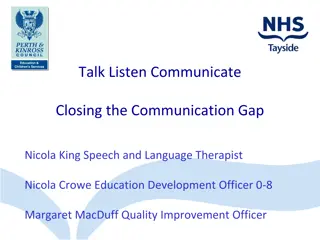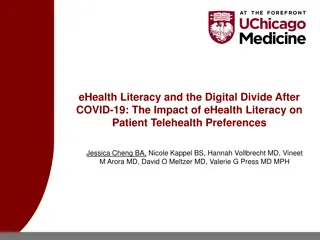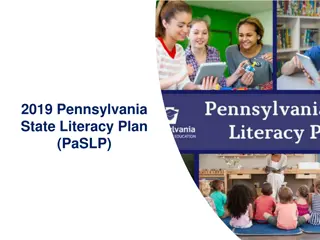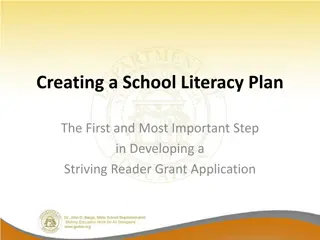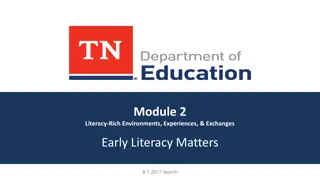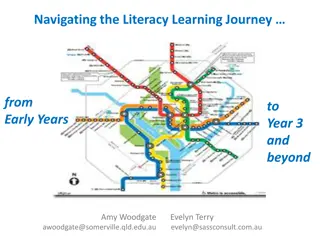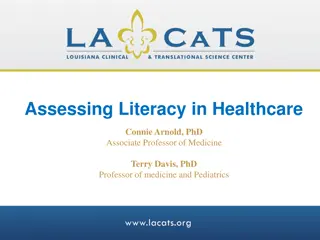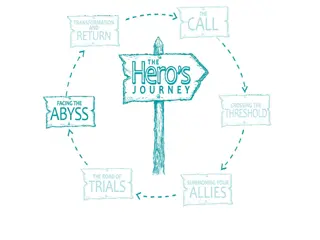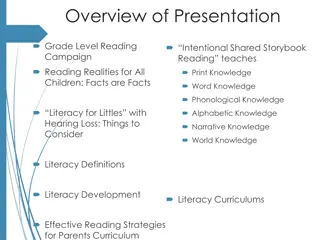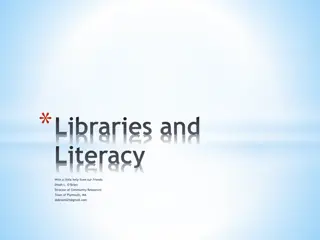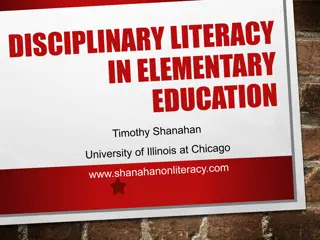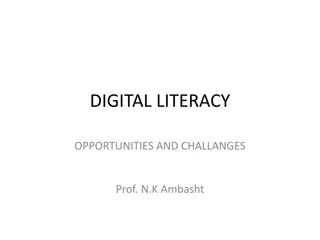Paradigm Change in Addressing Children's Literacy Difficulties
Professor Vivian Hill advocates for a paradigm change in understanding, assessing, and intervening in children's literacy difficulties at the AEP Conference. Challenges in the field are discussed, including the need to move towards inclusive, universal responses for all children with literacy delays. Warwickshire County Council's stance on dyslexia is debated in the House of Lords, with conflicting views on the diagnosis's validity and implications for educational approaches.
Download Presentation

Please find below an Image/Link to download the presentation.
The content on the website is provided AS IS for your information and personal use only. It may not be sold, licensed, or shared on other websites without obtaining consent from the author.If you encounter any issues during the download, it is possible that the publisher has removed the file from their server.
You are allowed to download the files provided on this website for personal or commercial use, subject to the condition that they are used lawfully. All files are the property of their respective owners.
The content on the website is provided AS IS for your information and personal use only. It may not be sold, licensed, or shared on other websites without obtaining consent from the author.
E N D
Presentation Transcript
AEP Conference 2022 Reasserting professional control over the understanding, assessment and intervention approaches to children s literacy difficulties: time for a paradigm change Professor Vivian Hill, UCL Institute of Education
DECP Literacy Difficulties Working Group October 2018 House of Lords Debate Powerful lobby groups and business interests Supporting EPs and the profession on leading developments in this domain and ensuring greater equity of access Working group rational Membership and function JPLG involves all key stake holders Reasserting the professional role of EPs Challenges Paradigm change Moving away for exclusionary criteria to inclusive universal responses to all children with literacy delay
Warwickshire County Council research in the field of dyslexia lacks consensus "the techniques used to teach reading to children diagnosed with dyslexia are the same as those used to teach any other struggling reader". A diagnosis of dyslexia does not provide any additional information that is useful for addressing the difficulties nor does it predict the rate of progress, "It is widely accepted that the diagnosis of dyslexia is scientifically questionable and can be misleading,".
Lord Watson: My Lords, this is not a party-political issue...Warwick County Council s guidance to parents ignores the science and refuses to recognise that dyslexia is a medical condition. One wonders if, perhaps, it has also advised their residents that the earth is actually flat and that there is no such thing as global warming. With Cambridgeshire and Staffordshire considering aligning themselves with Warwickshire County Council s position, I think it is important that the Government set out what action they will take to ensure that this misguided guidance is withdrawn as a matter of urgency.
Lord Storey My Lords, the Minster will recall that during the Children and Families Act, the local offer required local authorities to give information about special needs provision, and that information has to be accurate. Does the Minister not agree that it is not helpful to parents when false information is given out by councils, particularly on this issue of dyslexia? Will the Government clarify whether they fully support the recognition of dyslexia as a disability as defined by the Equality Act 2010?
"Warwickshire County Council does, and always has, recognised dyslexia along with the many other needs we see coming through our schools. "We are confident that the guidance produced by Warwickshire County Council Educational Psychology Service, and followed by schools and services, is sound and the needs of children and young people are being met."
TES: Council attacked for saying dyslexia questionable https://www.tes.com/magazine/archive/council-attacked-saying-dyslexia-questionable Warwickshire County Council says diagnosing children with dyslexia 'does not provide any additional information' Caroline Henshaw
https://www.theguardian.com/news/2020/sep/17/battle-over-dyslexia-warwickshire-staffordshirehttps://www.theguardian.com/news/2020/sep/17/battle-over-dyslexia-warwickshire-staffordshire The long read by Sirin Kale The battle over dyslexia
Concepts of dyslexia Enshrined in public and political discourses; Seen as a distinct medical aetiology to be diagnosed and treated; Position not supported by developing research evidence; Power of lobby groups; Distorted narratives;
The Power of Lobby Groups charity discourse dominates the discussion about dyslexia in the media and have the power to construct their own truth and knowledge about dyslexia because they have positioned themselves within society to have an authoritative voice on dyslexia Simblett (2021)
The Government decided to spend time and money looking specifically at dyslexia because of the strength of the dyslexia lobby, rather than because of any pre-existing, well researched, well defined problem We recommend that the Government be more independently minded: it should prioritise its efforts on the basis of research, rather than commissioning research on the basis of the priorities of lobby groups House of Commons Science and Technology Committee, (2009).
Current Theory and Research Evidence Despite a substantial and continuing body of research there is, as yet, no scientific consensus about the nature or causes of literacy difficulties (Elliott and Grigorenko 2014). We do not have consensus about unambiguous, scientifically validated means of discriminating between those for whom acquiring proficiency in literacy is problematic and a discrete subgroup who might be confidently described as dyslexic (Stanovich 1994, Elliott and Grigorenko 2014, Sadusky, Berger et al. 2022).
The dyslexia debate is a long standing highly charged area of controversy in the profession and within society. Despite clarity about the issues with the term it is proving hard to effect change. There is no point trying to define dyslexia until it is clear what is the basic construct or concept to be investigated. The definition of the concept comes first and the word follows, not the other way around Rutter (1998)
For a word to be used for a scientific concept, it must satisfy certain criteria: Stanovitch (1996) proposes a well defined biologically based condition should have (i) distinct phenotypic patterns, (ii) distinct heritability patterns and (iii) distinct neuroanatomical characteristics. Pumfrey and Reason (1991) A labelling condition requires a distinct aetiology, identifying characteristics, prognosis and response to intervention.
Miles (1995) it is impossible to give one authoritative theoretical definition to such a complex and multifaceted condition. The BPS 1999 definition- dyslexia retained as a widely used word: Dyslexia is evident when accurate and fluent word reading and/or spelling develops very incompletely or with great difficulty. This focuses on literacy learning at the word level and implies that the problem is severe and persistent despite appropriate learning opportunities Maintaining the word dyslexia is not sustainable if we are to effect change.
Time for Paradigm change Influence the factors considered to effect behavioural functioning; Influence what is considered adaptive and maladaptive; Influence what is considered to be an appropriate foci for intervention. Paradigm change Kuhn (1970) in The Structure of Scientific Revolutions described how science progresses through alternating periods of stability, when an existing model of reality dominates for a protracted period, followed by revolution, when the model or reality itself undergoes sudden drastic change. It is time for change.
Philosophical Orientations From deterministic orientations: based on the assumptions that the behaviour is governed by internal or external forces over which we have no control, and consequently behaviour is predictable. To probabilistic orientations: based on hypotheses that are designed to be evaluated in terms of the probability of it being correct, rather than in terms of its being true or false.
Social Justice Poor literacy is a risk factor for school exclusion, low attainment, truancy and unemployment and low pay, National Literacy Trust (2014). Poor literacy - not causal but a contributory risk factor for offending, one third in custody have literacy difficulties compared to one fifth of the general population, Brooks (2019) & Creese (2016). The correlation between literacy levels and income in UK is the highest in Europe, risk factor for unemployment (OECD, 2013) possible factor in the high levels of poverty in the UK (HM Government, 2014)
Unequal need Literacy difficulties, in our poorest communities 1 in 4 have very low literacy levels compared to 1in 20 in the most affluent communities. National Literacy Trust (2014) The SEND population with low literacy levels are over represented in low income populations (Parson & Platt (2013); Thompson 2012) DFE, 2021-2022 - achieving required outcomes at end of key stage 2 & 4 is mediated by disadvantaged status. At KS4 outcomes are also mediated by ethnicity, with Black Caribbean, Mixed Caribbean, Irish Traveller and Gypsy Roma heritage pupils less likely to pass GCSEs, even after mediating for financial disadvantage.
Unequal access Despite the evidence of the higher incidence of literacy delay and associated SEND in our poorest communities, the distribution of SEND labels, including dyslexia, is over represented within our higher income populations (Parson & Platt, 2013, Tomlinson, 2012) Knight & Crick (2021) reviewed the UK Millennium Cohort data and found being identified as dyslexic was strongly associated with factors including income and SES. In the USA Odegarde et al (2020) also found a strong association between SES and being identified as dyslexic.
Promoting equity The right to access timely support for literacy difficulties is our aim for all children irrespective of their background. We respect parents who are able to champion their children but not all parents have the same resources or access and this is our concern. We must challenge a system where accessing the label of dyslexia, which is likely to provide access to additional support and resources, is disproportionately more likely to occur in our more affluent communities, whilst the risk factors and incidence are highest in our poorest communities, (Gibbs & Elliott, 2020).
Where are we now: The Hancock Bill is being prepared for its second reading in parliament. This would enshrine in law that all children must be screened for dyslexia before the end of primary school. The first reading in parliament referred to the risks of undiagnosed dyslexia (Matt Hancock - Dyslexia Screening Bill 2021-22 contributions (parallelparliament.co.uk)). How would this be operationalised? What are the cost and professional time implications? What would the screening involve?
Shifting support from individual to systemic responses The numbers simply do not add up there are far too many struggling readers to operate a detailed and vastly expensive clinical model of this kind Gibbs and Elliott (2020). Prevalence rates of literacy difficulties vary between 3 21% (e.g. Ferrer, Shaywitz, Holahan, Marchione, Michaels, & Shaywitz, 2015; Snowling & Melby-Lerv g, 2016). An estimated 1.8 million children in the UK have literacy difficulties.
Response to intervention The new paradigm for identifying and addressing literacy difficulties must involve an explicit move to systemic and strategic frameworks. Must be consistent with recent developments in academic research about what works for identifying and addressing literacy difficulties. Must be implementable on a large scale and equitable. Systemic frameworks must be able to take into account individual needs and should operate regardless of the terminology used to refer to literacy difficulties. (Stanbridge et al (2022)
Response to intervention (RTI) The Response to Intervention (RTI) model has a solid basis in research, (e.g. Fuchs & Fuchs, 2009; Fuchs, Fuchs & Compton, 2012; Gibbs & Elliott, 2020) and is scalable to large organisations and populations (Ofsted, 2022). RTI also eradicates a wait to fail approach through its emphasis on universal screening and intervention. RTI is ethically and educationally justifiable and circumvents any need for a diagnosis model, Gibbs and Elliott (2021) . RTI is evidence based and at the heart of current systemic responses in Warwickshire, Staffordshire and Cambridgeshire
Key Findings and Principles: No evidence of a discrete, identifiable group of those with literacy difficulties; nor any consistent intervention that makes a difference; We need to move from deterministic to probabilistic models of literacy difficulties; Shift from diagnosis to identification; Intervention access is based on models of social justice promoting equality and non discriminatory practice no exclusionary criteria - literacy support for all;
Systemic responses embedded in Local Authority Children s Services and available for every child; Response to intervention model is used to identify and refine interventions and support; Culminating in individualised tailored responses for those who do not respond to early phases of strategic intervention.
Activity Does your service have a literacy difficulties policy? If so what position is taken regarding literacy difficulties? Does your Service/LA/CS have a systematic offer to schools to support literacy development? How do you, as an EP, support schools to meet literacy needs? What assessments do you use? What do you recommend? What do you do/say if a parent/school asks you to assess for dyslexia?
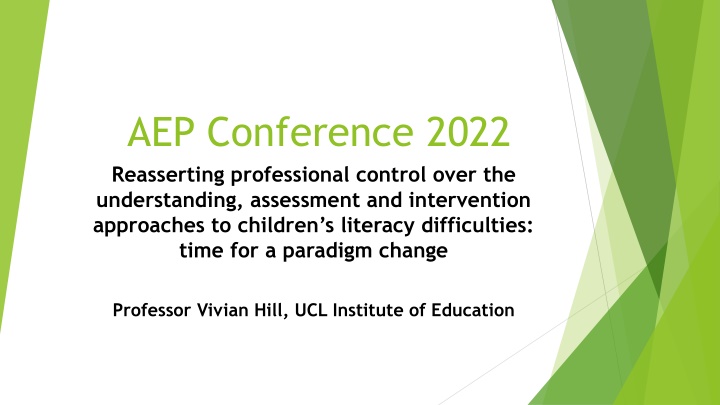

![[PDF⚡READ❤ONLINE] Black Hole Astrophysics: The Engine Paradigm (Springer Praxis](/thumb/21503/pdf-read-online-black-hole-astrophysics-the-engine-paradigm-springer-praxis.jpg)


